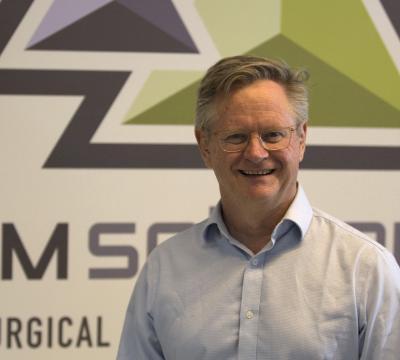"It’s in the creativity of the approach"
- Wits Alumni Relations
Wits-trained engineer honoured for his contribution to the field of mineral dissolution.
Dr Frank Crundwell (BSc Eng 1983, MSc Eng 1986, PhD 1988, BSc Hons 2001) has been elected to the 2023 class of the National Academy of Engineering (NAE).
Founder of CM Solutions Metallurgical Laboratories and visiting professor in the School of Chemical and Metallurgical Engineering, Dr Crundwell, was honoured for his significant contribution and achievements in the field of mineral dissolution to optimise metal extraction. Dissolution is a crucial process with far-reaching implications for various industries, ranging widely from mineral weathering to dentistry.
The NAE is widely regarded as one of the most prestigious professional organisations for scientists and engineers worldwide and election of new members is the culmination of a year-long process. Membership honours those who have made outstanding contributions to “engineering research, practice, or education, including, where appropriate, significant contributions to the engineering literature” and to “the pioneering of new and developing fields of technology, making major advancements in traditional fields of engineering, or developing/implementing innovative approaches to engineering education”.
When asked by Alumni Relations about the significance of his achievement, Dr Crundwell said: “Being recognised is wonderful, a great affirmation, but it doesn’t change anything. The election to the NAE is in recognition of the research work that I have done, and awards received, and there are many factors at play.”
Dr Crundwell is an authority on dissolution and leaching for which he was awarded the Milton E Wadsworth Metallurgy Award in 2020 by the Society for Mining, Metallurgy and Exploration. His recent work on silicates and oxides has garnered considerable attention in the geochemistry and geoengineering fields.
He said that “creativity” and a “non-linear problem solving” approach were the key ingredients in his recipe for success. “I mean, not necessarily starting at the beginning and working through a problem, but looking at the overall area, bring different fields of study to the problem, looking at all the component problems, redefining the problem while searching for solutions.
“I’ll give you an example. When I was a lecturer at Wits, I got interested in bacterial leaching. The predominant view at the time was that the bacteria could directly consume/attack/eat minerals. However, I started with mathematically modelling the tests that others performed and saw that simpler explanations might be involved. Then I looked at the experimental designs and found flaws in that.
“We redefined the ways in which other researchers conceptualised the bacterial activity on minerals. But the real breakthrough came when I realised that I could grow the bacteria in an electrochemical cell – two vastly different fields! This enabled me to develop a much better apparatus, and once that was done, my students and I were able to resolve the debate and show that bacteria didn’t directly attack the minerals, but that the main action was mediated by a chemical intermediate. This work was published in the top microbiology journals – although we were chemical engineers!
“I did the same thing for the dissolution of minerals. I noticed that an impurity accelerated the rate at which zinc sulphide dissolved, and asked why. This lead me down the path of how semi-conducting properties of minerals play a part in their dissolution, which resulted in the unlikely combination of semiconductor physics with mineral dissolution, all done by a chemical engineer!”
He shared a few memories of his time at Wits: “Anyone who entered the chemical engineering building over a period of 35 or more year would have crossed paths with Donald Williams (BSc Eng 1966, MSc 1966). All of us have stories of survival of his course! He taught with minimal notes and exacting tutorials. Requests for assistance were met with 'think for yourself' or similar. Although we bore scars, I learned to be scientifically rigorous in a take-no-prisoners manner from him and my colleagues whom he greatly influenced.
“We had a great class of students, Dr Bruce Young (BSc Eng 1983, MSc 1985, PhD 1989), Cavan Hill (BSc Eng 1983, MSc Eng 1986) and Brett Cronje (BSc Eng 1983, MSc Eng 1986), challenged me to keep up with them. We remain life-long friends.
“In addition, the Department of Chemical Engineering had a magnificent staff that taught me and who I later joined as a staff member: Tony Bryson (BSc 1962 PhD 1966), Bill Harris (BSc Eng 1962), Dr Kevin Brooks (BSc Eng 1980, PhD 1986), and Sven Godorr (BSc 1988, MSc 1991, PhD 1999), to name a few. I was fortunate to learn from them as an undergraduate and a staff member.”
Dr Crundwell will formally be inducted during the NAE’s annual meeting on 1 October 2023.


